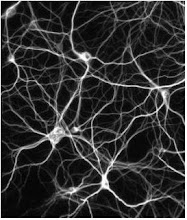I may already have posted today. Or it may have been last night. I don't actually know. I don't remember time in a continuum for the most part. Very often my memory is just filled with snatches of events unconnected to the rest of my memory. I'm not sure how normal that is, and I don't particularly care.
The reason memory comes up, other than my lack of knowledge about when I last posted, is that the way my memory works influences my understanding of the world. It's a question asked in much great literature, what, if not memory, makes up us?
My favourite example isn't currently accepted as literature, but I expect it will simply because of the artistry of it. The television show Skins is where I'm getting this example from. The show is brilliantly written, and brilliantly acted, and all around great. At the end of series 1, one of the main characters, Tony, is hit by a bus.
This causes severe head trauma, as is to be expected. He ends up with the full regimen of neurological problems that come from having your skull run in with a bus. Various memory things and deficiencies in knowing how to perform tasks, even sexual dysfunction.
Throughout series 2 the show deals with his coming back into his own, and remembering things he'd forgotten, getting back skills he had lost. Series two covers other things as well, but this is a main story line for it. For a large part Tony changes as a person, becomes less manipulative, suggesting his earlier machinations were more a matter of choice than of personal make up. What is telling is what stays and what is stripped away. What about him remains him once he can no longer be sure about his memories?
I know psychology, and neuroscience are starting to answer these sorts of questions, moving them out of the realm of literature and into the realm of knowledge. It's something I'm rather proud of. I feel like maybe it's the reason I'm becoming a psychologist and not a "thinker". I'm not likely to be writing books on existentialism any time soon, because I will be questioning and finding out things about existence through science. In any other era, Any other time, I would be asking my questions only of myself, and getting very little in the way of results.
It's a great era. People of course worry that knowing (or getting towards knowing) the root of all of this will remove the grandeur, but I don't see where they're coming from. I don't have to think of a soul to be amazed by the complexity of a brain. The vastness of the universe and our solitaryness in it is something to be marvelled as much as the power of the gods.
I don't see a problem with the onus of knowledge of the depths of humanity being moved to neuroscience from philosophy. I welcome it.
I welcome what shall come in the way we see ourselves. I hope that the advances we make now aren't passing. I hope that what we come to know is not fleeting. If it is, so be it, however, we've so much potential, I just wish we'd reach it.
Subscribe to:
Post Comments (Atom)

No comments:
Post a Comment